Courses
Plan Your 2025-2026 Schedule
Courses in Classics (CLA / GRK / LAT)
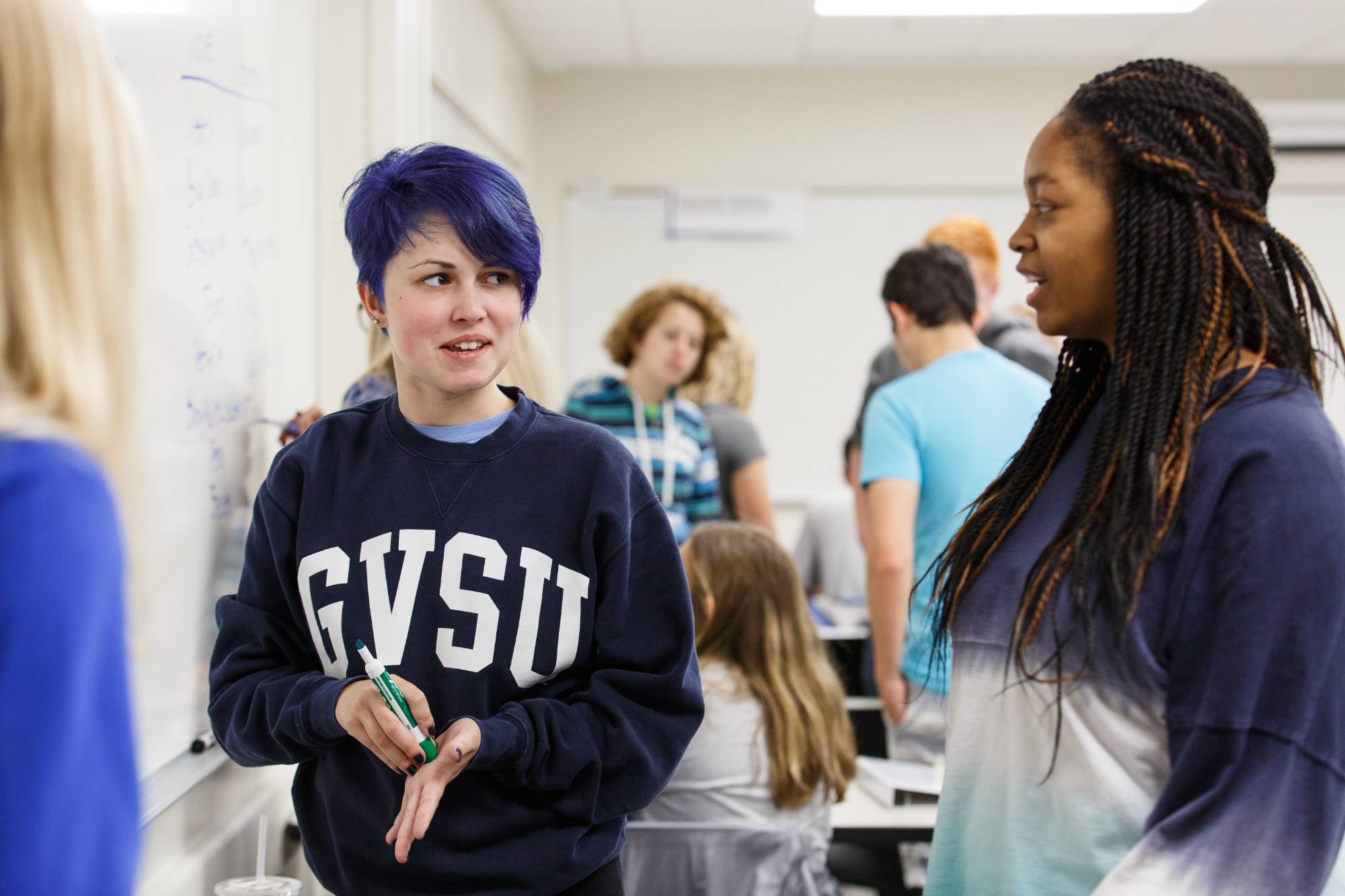
Courses offered by the Department of Classics
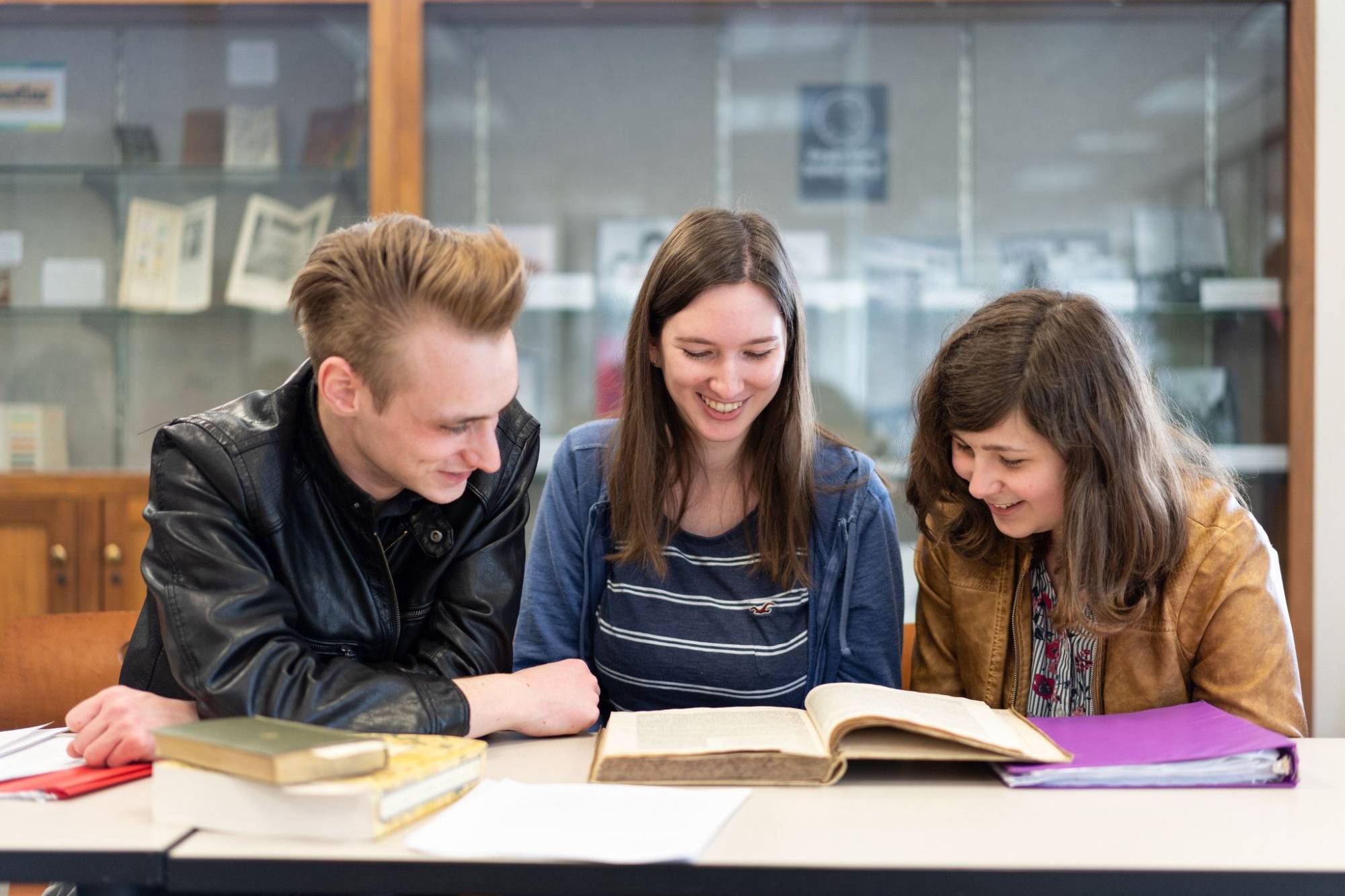
Courses in Classics are designed to meet the needs of a variety of students.
All of the courses offered by Classics share an emphasis on encountering the classical world through primary sources, both textual and material. Complementing this emphasis is the study of the living tradition that has shaped - and continues to shape - the way in which we construct our world today.
Courses in Latin and Ancient Greek fulfill the university's foreign language requirement, while classical civilization courses fulfill many General Education and Honors requirements.
Many find that working with the classical languages improves their grasp of English and their skills as readers and writers.
The Department offers courses in ancient Greek (GRK), in Latin (LAT), and in Classical Civilization (CLA). All courses are taught in English. Language courses stress reading comprehension rather than speaking. No course requires attendance at language labs.
See also courses offered by related programs.
Ancient Greek (GRK)
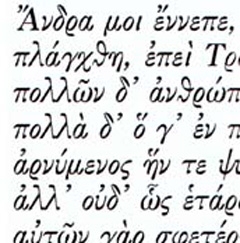
Greek is the language of Homer and Sappho, of Aeschylus and Aristophanes, of Herodotus and Thucydides, of Plato and Aristotle, and of the New Testament.
Courses in Ancient Greek
GRK 101 - Elementary Ancient Greek I. An introduction to ancient Greek vocabulary, grammar, and syntax with an emphasis on reading works from the Homeric and classical periods. Offered fall semester. Credits: 4
GRK 102 - Elementary Ancient Greek II. Continuation of GRK 101. Language work will be supplemented with discussions of ancient Greek history and culture. Offered winter semester. Prerequisites: Completion of GRK 101. Credits: 4
GRK 201 - Intermediate Ancient Greek I. Continuation of GRK 102. Reading of an entire dialogue by Plato, such as the Apology or Crito. Offered fall semester. Prerequisites: Completion of GRK 102. Credits: 4
GRK 202 - Intermediate Ancient Greek II. Readings from Homer’s Iliad or Odyssey, supplemented by study of early Greek history and culture. Fulfills Cultures - World Perspectives. Offered winter semester. Prerequisite: GRK 201. Credits: 3
GRK 285 - Study Abroad: Intermediate Ancient Greek. Of varying focus, the course makes use of the history, culture, and society of a host country in order to highlight disciplinary perspectives in context. To be taught in that country (or countries) as part of an approved study abroad program. By permit only. Credit may vary. Credits: 1 to 6
GRK 350 - Greek Prose. Reading of texts representative of such genres as the philosophical dialogue (Plato), forensic and political oratory (Demosthenes, Lysias), historiography (Thucydides, Xenophon), or pastoral/homiletic/apocalyptic (the Pauline epistles, Revelation). Emphasis on the forms of prose that helped shape the western tradition. Offered fall semester of even-numbered years. May be repeated for credit when topics vary. Prerequisite: GRK 202. Credits: 3
GRK 351 - Greek Poetry. Study of ancient Greek poetry such as the Homeric Hymn to Demeter, Hesiod’s Theogony, Greek dramatic poets, or the lyric poetry of Archilochus, Sappho, and Simonides. Special attention to the meter, meaning, and context of poetry designed for public performance. May be repeated for credit when topics vary. Offered fall semester in odd-numbered years. Prerequisite: GRK 202. Credits: 3
GRK 385 - Study Abroad: Advanced Ancient Greek. Of varying focus, the course makes use of the history, culture, and society of a host country in order to highlight disciplinary perspectives in context. To be taught in that country (or countries) as part of an approved study abroad program. By permit only. Credit may vary. Credits: 1 to 6
GRK 399 - Independent Reading. Supervised independent reading in Greek. Topic, credit, and time must be arranged with individual faculty member before registration. Offered fall and winter semester. Credits: 1 to 3
GRK 400 - Advanced Greek Prose. Reading of texts representative of such genres as the philosophical dialogue (Plato), forensic and political oratory (Demosthenes, Lysias), historiography (Thucydides, Xenophon), or pastoral/homiletic/apocalyptic (the Pauline epistles, Revelation). Emphasis on the forms of prose that helped shape the western tradition. Special attention to electronic resources in classics and to textual criticism. May be repeated for credit when topics vary. Offered winter semester in odd-numbered years. Prerequisite: One 300-level Greek course. Credits: 3
GRK 401 - Advanced Greek Poetry. Study of ancient Greek poetry such as the Homeric Hymn to Demeter, Hesiod’s Theogony, Greek dramatic poets, or the lyric poetry of Archilochus, Sappho, and Simonides. Special attention to the meter, meaning, and context of poetry designed for public performance. Special attention to electronic resources in classics and textual criticism. May be repeated for credit when topics vary. Offered winter semester in even-numbered years. Prerequisite: One 300-level Greek course. Credits: 3
Latin (LAT)
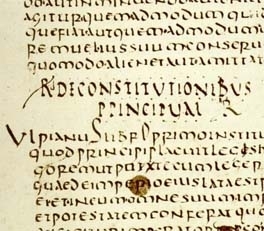
Even after the Roman Empire collapsed, Latin remained the language of literature, science, philosophy, medicine, law, and religion for over a thousand years.
Courses in Latin
LAT 101 - Elementary Latin I. An introduction to Latin vocabulary, grammar, and syntax with emphasis on the language of the classical period. Offered fall semester. Credits: 4
LAT 102 - Elementary Latin II. Continuation of LAT 101. Offered winter semester. Prerequisite: LAT 101. Credits: 4
LAT 150 - Intensive Elementary Latin. An intensive review of the essentials of Latin grammar and syntax for students with prior study but who are not adequately prepared for 200-level courses. Not open to students with credit in LAT 101, 102, or their equivalent. Offered winter semester. Prerequisites: prior experience of Latin at secondary level or permission of instructor. Credits: 4
LAT 201 - Intermediate Latin I. Continuation of LAT 102. Introduction to the study of selected ancient authors. Offered fall semester. Prerequisites: LAT 102 or appropriate high school background. Credits: 4
LAT 202 - Intermediate Latin II. Readings in Virgil’s Aeneid, supplemented by study of the history and culture of Augustan Rome. Offered winter semester. Prerequisite: LAT 201, or appropriate high school background. Fulfills Cultures - World Perspectives. Credits: 3
LAT 285 - Study Abroad: Intermediate Latin. Of varying focus, the course makes use of the history, culture, and society of a host country in order to highlight disciplinary perspectives in context. To be taught in that country (or countries) as part of an approved study abroad program. By permit only. Credit may vary. Credits: 1 to 6
LAT 350 - Latin Prose. Readings from the works of authors such as Cicero, Livy, Pliny, Tacitus, in genres such as oratory, history, philosophy, and epistolary writing. Attention to the development of genre and to the ways in which Latin prose has helped shape the western tradition. May be repeated for credit when topics vary. Offered fall semester of odd-numbered years. Prerequisite: LAT 202. Credits: 3
LAT 352 - Roman Poetry. An introduction to Roman poetry other than epic through a close reading of works such as the comedies of Plautus or Terence; the love poetry of Tibullus, Catullus, Propertius, or Ovid; the lyric poetry of Horace; the minor poetry of Ovid, Martial, or Juvenal. May be repeated for credit when topics vary. Offered winter semester in alternating, even-numbered years. Prerequisite: One 300-level Latin course. Credits: 3
LAT 353 - Latin Prose Composition. Study of Latin syntax and prose style, with emphasis on introductory prose composition and reading select prose models (Sallust, Cicero, Seneca, Pliny, Tacitus). Special attention to broad grammatical structures, complex syntax, and stylistic variations. May be repeated for credit when topics vary. Offered winter semester, odd-numbered years. Prerequisite: LAT 351.
LAT 380 - Special Topics in Latin. Course content varies. Refer to schedule of classes to determine course description and prerequisites. Students may repeat this course under different topics. Credits: 1 to 4
LAT 385 - Study Abroad: Advanced Latin. Of varying focus, the course makes use of the history, culture, and society of a host country in order to highlight disciplinary perspectives in context. To be taught in that country (or countries) as part of an approved study abroad program. By permit only. Credit may vary. Credits: 1 to 6
LAT 399 - Independent Reading. Supervised independent reading in Latin. Topic, credit, and time must be arranged with individual faculty member before registration. Offered fall and winter semesters. Credits: 1 to 3
LAT 400 - Advanced Latin Prose. Advanced study of Latin prose authors such as Caesar, Cicero, Sallust, Livy, Seneca, Pliny, and Tacitus. Special attention to electronic resources in classics and elements of textual criticism. Offered winter semester of even-numbered years. Prerequisite: One 300-level Latin course. Credits: 3
LAT 401 - Advanced Roman Poetry. Advanced study of Roman poets such as Plautus, Catullus, Lucretius, Virgil, Horace, Ovid and Juvenal. Special attention to electronic resources in classics and elements of textual criticism. May be repeated for credit when topics vary. Offered fall semester. Prerequisite: One 300-level Latin course. Credits: 3
LAT 404 - Latin Narrative. Study of Latin narrative in verse or prose, in genres such as epic poetry (Ennius, Virgil, Lucan), the Roman novel (Petronius, Apuleius), biography (Suetonius), and historiography. Special attention to the evolution of narrative forms and to narrative as a vehicle of social commentary. Offered winter semester of even-numbered years. Prerequisite: One 300-level Latin course. Credits: 3
Classical Civilization (CLA)
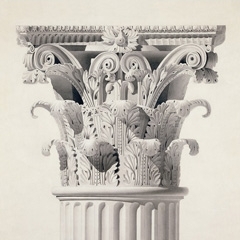
All of the courses offered by Classics share an emphasis on encountering the classical world through primary sources, both textual and material. Complementing this emphasis is the study of the living tradition that has shaped - and continues to shape - the way in which we construct our world today.
Courses in Classical Civilization
CLA 101 - Greek and Roman Mythology. An introduction to the gods and heroes of ancient Greek and Roman myths in their cultural and historical contexts, as well as their modern influence. Fulfills Foundation - Philosophy and Literature. Offered fall semester. Credits: 3
CLA 121 - Greek Civilization. An introduction to the major cultural accomplishments of ancient Greece from the Bronze Age through the death of Alexander the Great. Emphasis on Greek literature, art, philosophy, and political institutions both in their historical contexts and as achievements of continuing importance in the contemporary world. Fulfills Foundation - Historical Analysis. Offered fall semester. Credits: 3
CLA 131 - Introduction to Roman Civilization. An introduction to the major accomplishments of ancient Rome from the Iron Age to Late Antiquity. The course examines significant aspects of Roman political, social and cultural life, both in their primary context and in terms of their relevance to society today. Fulfills Foundation - Historical Analysis. Offered winter semester. Credits: 3
CLA 195 - Introduction to Ancient Greece and Rome. Introduction to the study of the breadth and variety of ancient Greek and Roman culture - including languages and literatures, art and archaeology, religious and philosophical traditions, and social and legal forms - from the Bronze Age through the late Roman Empire and early Christianity. Offered fall semester. Credits: 1
CLA 201 - Classical Literature. Great works from the ancient world in translation, selected from Homeric epics, plays of Aeschylus, Sophocles, Euripides, and Aristophanes, and from such other classic works as Virgil’s Aeneid, the Bible, and Eastern epics such as Gilgamesh. Fulfills Foundation - Philosophy and Literature. Prerequisite: WRT 150. Credits: 3
CLA 231 - Health and Science in Antiquity. An introduction to ancient Greek and Roman medical and other scientific practices in their cultural and historical contexts, as well as their modern influence. Topics include the human body and its relationship to its environment, theories of causality, and early astronomy. Fulfills Foundations - Philosophy and Literature.
CLA 250 - Classical Art and Archaeology. Survey of the art and archaeology of the classical world from the Bronze Age through the dissolution of the Roman Empire. Emphasis on the development of the characteristic forms of classical art, the aesthetic and historical contexts of specific works, and the techniques of classical archaeology that have revealed them. Fulfills Foundation - Arts. Offered winter semester. Prerequisite: WRT 150. Credits: 3
CLA 301 - Re-imagining the Classics. Study of classical authors, genres, ideas, or aspects of visual culture and the ways they have been understood, adapted, and transformed in new cultural environments of later periods. The course may consider genres such as epic, lyric, or comedy; mythology or the history of ideas; styles of architecture or painting. Part of the Globalization Issue. Offered fall semester. Prerequisite: Junior standing. Credits: 3
CLA 302 - The Stages of Greek and Roman Drama. Readings of Greek and Roman tragedies and comedies by playwrights such as Sophocles, Euripides, Aristophanes, and Plautus (in English translation) will be augmented by considerations of cultural contexts, both ancient and modern global, and staging or adaptation. The dramas engage issues from competing perspectives on violence, gender, class, and justice. Fulfills Issues - Globalization. Offered winter semester. Prerequisites: Junior standing and WRT 150. Credits: 3
CLA 311 - Ancient Great Philosophers. A study of one or several ancient great philosophers, such as the Pre-Socratics, Plato, Aristotle, Lucretius. Focus will be on the philosophers’ writings, but attention also will be given to context and tradition. Cross-listed with PHI 311. May be repeated for credit if content differs. Offered fall and winter semesters. Prerequisite: Prior work in philosophy or classics, or permission of the instructor. Credits: 3
CLA 315 - Ancient Religion. A study of the religious beliefs and practices of the ancient world, emphasizing the religious traditions of Greece, Rome, Egypt, and the Near East. Topics include views of the afterlife, temples and sanctuaries, religion in daily life, “mystery” religions, and the rise of the monotheistic religions of Judaism and Christianity. Offered fall semester. Prerequisite: WRT 150. Credits: 3
CLA 325 - Body, Gender, Sexuality in Antiquity. Introduction to views about the body, gender, and sexuality in ancient Greece and Rome. Special attention is given to ancient texts that inform feminist and queer theory. Topics include ancient medicine and modern dietetics; the figure of Antigone in feminist and post colonial literature; Greek homosexuality, Victorian Hellenism, and American law. Cross-listed with WGS 325. Part of the Identity Issue. Offered fall semester. Prerequisites: Junior standing. Credits: 3
CLA 350 - Issues in Classical Archaeology. Advanced study of current issues in classical archaeology, based on multidisciplinary approaches to topics such as ethnicity, cult, technology, economy, provincial identities and imperial propaganda. Particular attention to synthesis of archaeological, art-historical, literary, and anthropological models and interpretive methods. May be repeated for credit when content varies. Offered fall semester in odd-numbered years. Prerequisite: none. Credits: 3
CLA 365 - Stoicism, Identity and the Happy Life. This course will address, through the life and thought of prominent Stoics, both the evolution of self and the development of an individual’s identity from the Stoic perspective. Through readings, writing, and journaling, students will explore the significance and relevance of key Stoic ideas about identity. Part of the Identity Issue. Offered fall semester of even-numbered years. Prerequisite: Junior standing. Credits: 3
CLA 367 - Thinking Like a (Roman) Lawyer. Many legal concepts we take for granted come directly from Roman Law, the influence of which continues to be felt world-wide today. This course introduces legal reasoning and analysis through a discussion-based, case-by-case approach focusing on primary sources in translation. Especially valuable for prelaw students. Part of the Human Rights Issue. Offered fall semester in odd-numbered years. Prerequisites: Junior standing and WRT 150. Credits: 3
CLA 380 - Special Topics in Classics. The study of special topics or areas in Classics and the Classical Tradition not offered in the regular curriculum. May be repeated for credit when content varies. Credits: 3
CLA 385 - Study Abroad: Classical Civilization. Of varying focus, the course makes use of the history, culture, and society of a host country in order to highlight disciplinary perspectives in context. To be taught in that country (or countries) as part of an approved study abroad program. By permit only. Credit may vary. Credits: 1 to 6
CLA 395 - Research Methods in Classics. Explores research methods in Classics, focusing both on the multidisciplinary nature of Classics and the primary methodologies employed across the discipline. Examines the ways that research questions are shaped, and the types of evidence used to address those questions, in Classics and in the Humanities more broadly. Credits: 2
CLA 415 - Museum Studies. Cross-listed with HST 415. Examines the history of museums; the organization, operation, and multiple functions of museums; their contributions to public life; and the political, legal, ethical, and other contemporary debates concerning the roles of museums as cultural institutions. Also introduces practical skills such as collections management, exhibition design, and public outreach and education. Offered Fall semesters. Prerequisite: Junior standing. Credits: 3.
CLA 495 - Notions of the Classics (Capstone). A critical examination of the concepts of “the classics” and “classicism” as a context for the contemporary field of classics, emphasizing the shifting range of the terms and the different ways both they and the classical world have been and can be understood, adapted, and transformed. Required for majors. Offered winter semester. Prerequisite: Senior standing. Credits: 3
CLA 499 - Independent Study and Research. Supervised individual research in an area of interest to the student; culminates in a research paper. Prerequisites: Junior standing and the permission of the instructor supervising the research. Credits: 1 to 3
Courses offered by related programs
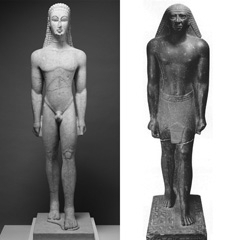
Students interested in Classics should also note the following courses offered by related programs:
ANT 215 Origins of Civilization
ANT 220 Introduction to Archaeology
ANT 350 Archaeology of the Middle East
COM 203 Argument and Analysis
ENG 204 World Mythology
HST 345 Silk Roads
HST 350 Ancient Greece
HST 351 Ancient Rome
HNR 211/212 Worlds of Greece and Rome I
HNR 221/222 Worlds of Greece and Rome II
PLS 231 Classical Political Thought

